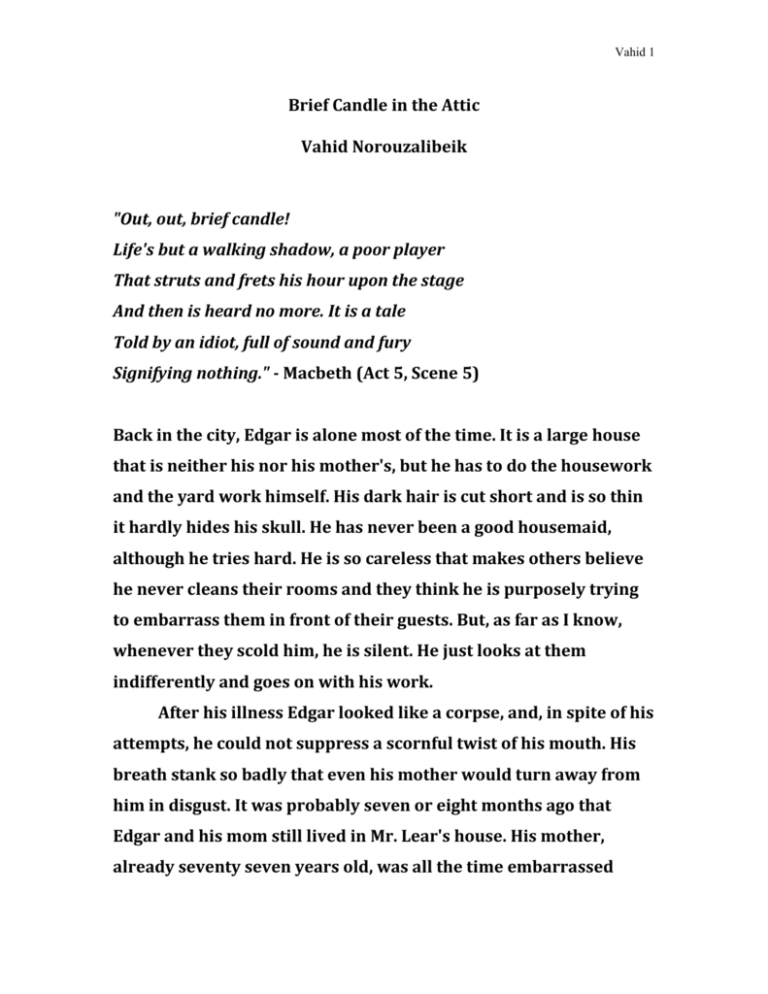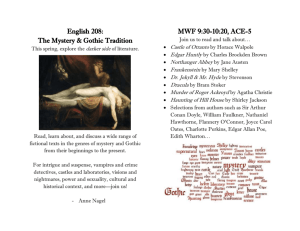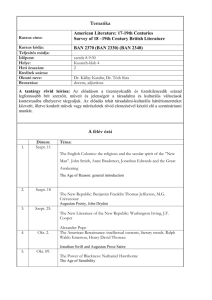doc - Ferment Magazine
advertisement

Vahid 1 Brief Candle in the Attic Vahid Norouzalibeik "Out, out, brief candle! Life's but a walking shadow, a poor player That struts and frets his hour upon the stage And then is heard no more. It is a tale Told by an idiot, full of sound and fury Signifying nothing." - Macbeth (Act 5, Scene 5) Back in the city, Edgar is alone most of the time. It is a large house that is neither his nor his mother's, but he has to do the housework and the yard work himself. His dark hair is cut short and is so thin it hardly hides his skull. He has never been a good housemaid, although he tries hard. He is so careless that makes others believe he never cleans their rooms and they think he is purposely trying to embarrass them in front of their guests. But, as far as I know, whenever they scold him, he is silent. He just looks at them indifferently and goes on with his work. After his illness Edgar looked like a corpse, and, in spite of his attempts, he could not suppress a scornful twist of his mouth. His breath stank so badly that even his mother would turn away from him in disgust. It was probably seven or eight months ago that Edgar and his mom still lived in Mr. Lear's house. His mother, already seventy seven years old, was all the time embarrassed Vahid 2 because of the son's humiliating mistakes. They had been living there, in Mr. Lear's house, for twenty-eight years since Edgar was just six. Edgar identifies his mom with the image he has of her with her hair wet and a towel wrapped around her, saying suddenly and loudly to him, "That’s bad, stop it!" One day Mr. Lear's guests shuddered when Edgar came into the room in his clumsy way, tripping over the doorsill even though his glasses again sat like a butterfly on the narrow bridge of his nose. He laughed at first, but suddenly his face was contorted with an unknown expression. One evening when he and his mother were watching a movie in their room, Edgar felt at the end that his own face had been changed in order to be properly shown. Then, the next night and at the same hour, the same thing occurred with the light of the television reflecting in Edgar's irises. He always wondered about the reality he represented. # One evening, when Edgar did not have something extraordinary to do but to clean the kitchen after a private meeting Mr. Lear had with some siblings, he stared strangely at the dishwasher making fun of the signification rules, muttering to himself: "Dishwa" … "Shwasher" … "Asher" … "Hwasher" … "Rewashdish" … "Why not Dis H Was Hers?" Edgar sighed deeply. 'H' reminded him of his father. Vahid 3 He had been admired a few times for his wit and literary talents. The last time was at his mom's birthday when Edgar recited lines from Paul Celan: Aspen tree, your leaves glance white into the dark. My mother's hair was never white. # "There was a bit of money, so I had it divided among my daughters," Mr. Lear was saying to Edgar's mom when Edgar was wandering in the wonderland of objects in the kitchen that night. "Of course they can do their own cooking if they wish. I only need a few girls part-time to clean and so on. The gardener left, retired, to live with his daughter. A big house is a respectable but expensive place to live and I do not seem to be able to afford it anymore." After his saddening monologue, Mr. Lear had given Edgar's mom some money with a letter in a sealed envelope, "Give him my regards when you see him." He had written the letter for one of his friends who was living in another city and needed to hire housemaids. When Edgar asked her mom what the meeting with Mr. Lear had been meant for, she simply responded, "Got a new job in a bigger house for a bit. You will see. There is still light, son." "I still cannot persuade myself it has not been due to my performance that Mr. Lear had decided to get rid of us." Money and infirmities of age seemed awkward excuses Mr. Lear had made up. That moment for Edgar was like when the Vahid 4 musicians cast aside their top hats, their instruments and their neutrality. # Approaching the door, Edgar knocked heavily. The little spotlight almost blinded them from the porch. Mr. Negotiable, Edgar's and his mom's new boss, was upstairs when they arrived there on that rainy evening. They had to wait, as they were told by the gentleman who had opened the door for them. There was a small front porch, upon which a long window and the front door opened. The door opened directly into the parlor; there was no side entry. Fiddling with the ivy that hung by the doorway, Edgar thought of the rustic feature it was adding to the house. The yellowing photographs hung on the wall above the broken piano fascinated him. # Mr. Negotiable told them he had chosen the attic for them. "It was made for storage and is easily twelve feet high where the roof bends skyward, more than enough room for you to stand. Over the years, my wife and I loaded it with boxes, furniture, and garbage bags full of extra belongings we both realized we didn’t need when we bought this house." Mr. Negotiable's manner of speaking reminded Edgar of the second stanza from the Arlington Robinson's poem, "Richard Cory": Vahid 5 And he was always quietly arrayed, And he was always human when he talked; But still he fluttered pulses when he said, 'Good-morning,' and he glittered when he walked. Edgar had memorized the whole poem when Gretta, Mr. Lear's daughter, and her friends had been discussing the poem for a few weeks with Edgar waiting on them. When Edgar's mom asked Mr. Negotiable about his wife, it seemed he was ignoring her question as if what had happened to his wife was clear enough. "We were living in a big house, a tiny palace, before we moved here. In our last wedding anniversary there, she received the whole town and observed the strictest etiquette, although she could no longer recognise faces of people." Edgar wanted to ask a question, but it stopped behind his lips when Mr. Negotiable continued, "The boxes are filled with my souvenirs from school and the garbage bags are stacked full of the memories of our being together. All right. Nicolas will show you the way and brief you on your duties here." Nicolas de Stael was the man who had opened the door for them when Edgar and mom got there. After some fumbling, Nicolas wanted them to follow him upstairs. He pulled open the door to the attic. Then he gazed up. The panel above was heavy but with a final Vahid 6 thrust he and Edgar managed to move it. Whether it was good or bad to be there was important neither to Edgar nor his mom because life did not seem to be leaving more options for them. Edgar had to do the housework and the yard work there, too. Mom did the cooking and was the "complaining machine," as Edgar would often call her. # The light of the setting sun tinged the house with delicate colors. Edgar was back with the bags of Sunday's shopping in his hands. He was shocked to see everybody downstairs, before the staircase. Cordelia, Mr. Negotiable's only daughter, was there, too. She swung up to Edgar, smiling with those increasingly white pearls between her lips. She greeted him with warmth that was more welcome to Edgar than the heat of the day. Words in their purgatorial life repeated over and over in his anxious mind. Edgar was not permitted to go upstairs. "Calm down, Edgar. Wait here, right here, with us," Cordelia wanted him in an authoritative tone. Her face softened. With her eye contact remaining secure, she took Edgar's hands and sat on the couch with him. # Edgar's thoughts reflected on the old accident. The red flash in the corner of his eye, the sudden impact and a thump that was still pounded in his head after all these years, when he was barely four years old. He had entered a strange world of shadows that day Vahid 7 as the car spun slowly on a timeless merry-go-round, until the motion ceased with a sickening lurch and then ... came the permanent silence of his father that time, after the impact, besides the lasting silence of the indifferent universe – the insane hunter – that was now catching his poor mom. Dr. Shim Faustus's car, parked outside, had made Edgar more restless. "Mrs. Negotiable, what’s wrong?" the words fell suddenly from his mouth, like prophetic bullets, sensing fear. # Edgar was leaning against the staircase when Mr. Negotiable's son-in-law finally appeared on the stairs with dr. Faustus following him. Like a drowning man clutching a straw, Edgar missed a breath. Words had perished and for Edgar they stopped to cherish. "Natural causes," announced the doctor, blinking an eye at Cordelia's husband. "Requiescat in pace! I'm so sorry, Mrs. Negotiable. Please accept my condolences," continued the doctor turning to Cordelia who was looking down at a piece of paper in her gloved hands. # Stumbling upstairs towards the attic, Edgar, with his eyes shining like never before and with all other voices Vahid 8 incomprehensible to him, was thinking of rewriting the last stanza of "Richard Cory" after having the dinner with his mom that night.








